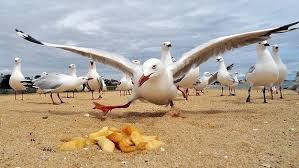They are familiar co-dwellers in our coastal resorts and increasingly found as permanent residents some distance inland in our towns and cities.
The reeling, noisy chorus of the gull is the perfect ambient soundtrack for a walk along the Promenade, the harbour wall or beach, It is, undoubtedly, a contributing factor to the taste of that bag of chips, ice cream, pastie, waffle, crepe and sand infused picnic that go with a traditional British seaside experience.
Yet, in recent years seagulls have been perceived as a problem demanding an extreme solution.
As part of a central government initiative to revitalise the often run down, dreary and uninviting seaside towns of the UK the seagull has become demonised as a threat, a deterrent to the leisure and enjoyment of day trippers or vacationers because of some isolated cases of aggressive behaviour. In one instance a girl is reported to have fallen off a quayside trying to evade swooping gulls and a pet dog is reported to have been killed in Cornwall which evokes Hitchcock type images of a supernatural, avian menace.
 |
| Gull Power |
A few prominent politicians in coastal constituencies have cited the seagull issue as the principal reason why the electorate feel blighted and besieged. There is some precedent elsewhere.
In Venice in 2015 the increase in the seagull population was seen as a problem in the main tourist areas leading to the introduction of measures to control nesting and breeding. Scarborough in North Yorkshire gained dispensation in 2015 for Licenced individuals to get rid of nests and eggs in situations where health and safety issues were present. This latter measure represented a major concession to the popular resort where frequent dive bombing of visitors by gulls was a perceived problem and especially as the most numerous of the species, Herring Gulls and Black Backed Gulls are protected species .
In reality the numbers of gulls is in decline from 750,000 breeding pairs in 1993 to current figures of around 378,000 pairs. The increase in reported aggressive behaviour may be, fundamentally, a survival instinct.
 |
| Chips away! |
This is just too much of a temptation to a natural scavenger species.
Gulls do give plenty of warning of their intention to make a grab for whatever hot food is wrapped in newspaper, the colourful sprinkle topped ice cream or hand grasped pastie.
Their 4 stage protocol includes an initial screeched warning to go away but leave the food, a low pass if the warning is ignored, a slow bombing run with a shot across the bows of droppings or vomit and then if human resistance or nonchalance is suspected a full 40mph swooping attack from behind.
The average Herring Gull is a big bird in size rather than weight and very intimidating in a full wing span outstretched lunge for its lunch or high tea.
Talk of a cull is however too drastic.
There are plenty of measures of control available to Environmental Health including the use of birds of prey, the broadcast of disturbing noise, strung bunting, anti-perching and nesting spikes and keeping rubbish in sealed bins or hessian sacks which are more difficult to burst. The more intrepid amongst seaside council staff have been known to remove gull eggs from nests and substitute them with sand filled plastic replicas or coat them in paraffin.
We should take some responsibility for the current predicament of seagulls arising from our own lifestyles.
Above all we should try to keep seagulls happy.
 |
| A seagull in the early stages of being annoyed |
This is because in a recent scientific study the natural constituents of gull droppings, a potent mix of ammonia, natural chemicals, viruses, fungal infections and bacteria were found to increase greatly in acidity when the birds became upset and stressed.
The prospect of involuntary vinegar on your chips well might spoil your day out at Blackpool, Skegness or Bognor.
No comments:
Post a Comment